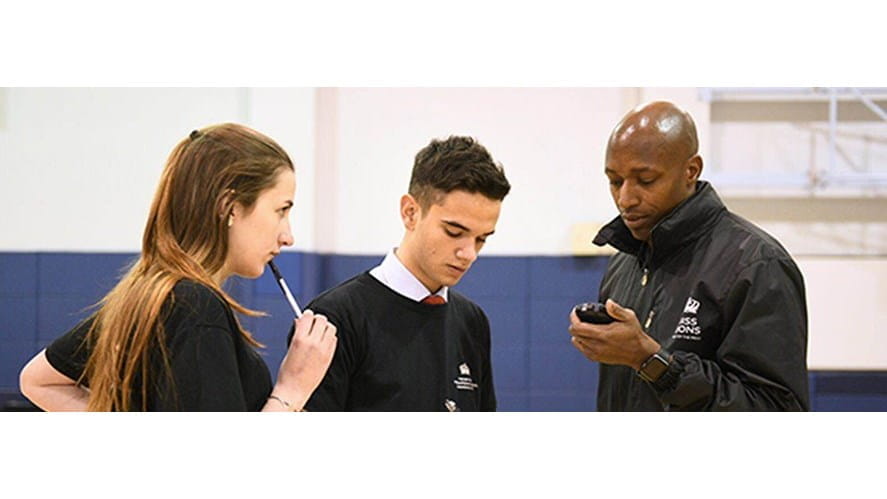We use cookies to improve your online experiences. To learn more and choose your cookies options, please refer to our cookie policy.
Open Days
Register for our Open Day!


One of the toughest decisions for any international sportsperson is when to retire. Olympic Gold Medalist Marlon Devonish shares his experience of deciding when to call it quits and how he used his experience in elite sports to create a new life after athletics.
There is no crystal ball. There are times in all of our lives that we all have to make decisions. You could be a student’s choosing courses, in a career deciding to stay in your role or make the jump or just at one of lifes junctions where you need to make a call and there really is no easy answer. It happens to all of us, and it happened to me when, at the end of my career everything I knew and had worked for had to come to an end.
Elite sports people commit themselves to a goal and do everything to reach it. Their own dedication and the relentless competitive pressure of other outstanding athletes drive them to success. There is always a clear goal, there is always a plan and there are a thousand decisions in between any of which could be the difference between winning and losing.
Over the course of my career in athletics and afterwards I created strategies for decision making that helped me push forward. Life has a way of throwing challenges at you and you don’t always get everything you want. However, you can always push forward if you adhere to a number of decision making principles.
One of the key pieces of advice I give in my business coaching and with students at BISS Puxi is to follow your own plan. In order to do this, first of all you need a plan to follow! You also need a system of milestones that allow you to check in on your progress and critically asses where you are against your plan. Essentially the clearer and more defined your goal is the easier it is to create a strong plan.
There are times when your plan is challenged. A dilemma is posed when an opportunity arises that was not in your original thinking. You have to question whether it is right to stick with the plan or to be flexible and find a new path.
“There is never a question of changing from my plan. The only question is how does any new opportunity fit into or improve my original plan. The goal, the plan. They always come first.”
It was the beginning of 2003 and I had a path that took me through the outdoor European, Commonwealth, World Championships and the ultimate prize, the Olympics. An opportunity arose to compete in the World Indoor Championships in Birmingham and as it was an indoor competition I was not keen to divert my resources or routine to take part in it. For me it was a distraction. I was ready to reject it. On this occasion, my coach persuaded me to compete on the basis that this would serve as a critical test of where I was in my preparation for my real short term goal which was the World Outdoor Championships in Paris later that year.
He persuaded me that in each plan you need a system of assessment, checking, recording, communicating and improving. I was lucky to have a team around me that critically assessed me in a positive way and had my best interests at heart. We do the same at BISS Puxi with all our students in the assessment, reporting and improving both in sports and across the school.
On this occasion I, with the support of my team took the opportunity of the Birmingham Indoor Championships as part of our overall plan. On the day, I won Gold at Birmingham and became the World Indoor Champion and have very fond memories of the day.
I officially retired in 2013 although the decision was made 12 months before that. Its not easy when your whole life is dedicated to a sport and its time just to switch it off. You know it will create an unfillable void. An inevitable decision looming in the distance. Do you deny it exists, delay it or face it head on?
I have always been interested in the psychological elements of sports. I knew that athletes that had been forced to quit through injury struggle more that those that made a conscious decision to stop. I wanted for it to me a decision that I made on my own terms. I knew also that not making a decision is, also a decision to remain with the status quo and make it work. This was clearly a decision I could not avoid
I had some key criteria that worked for me in terms of decision making. Athletics these days is very data driven. There was data on personal performance times competitor times, recovery times, nutrition intake, sleep and a host quantative information that helped me make decisions. This is specific to elite athletics but I encourage you to also consider what data metrics you have at school, at work and at home in decision making.
And then there’s gut feel. I had to be very honest with myself about whether I still wanted to make the sacrifices necessary to reach the highest level in athletics and whether I would be satisfied to just be part of the team.
My whole mindset was one of pushing through challenges and to ‘give up’ because it was getting hard was against everything I know and stood for. I wanted to continue to be the best I could be and compete at the highest level. At the same time I knew my career had to some to an end and I wanted it to be my decision.
I have a small group of key people who are close to me. My sprint coach, my agent also a former sprinter, my wife and family that I fall back on to make the major decisions. It’s a small group but I trust them to have my best interests at heart. Sometimes you need a different perspective and its important to be humble and listen to hard truths from people who want the best for you.
I weighed up the feedback I received from my close knit community of advisors against what my body was telling me and what I knew about myself. In 2012 I made the decision to retire and although I did not make it public inside I committed to it fully.
My plan had to change and change radically. The security of the life I knew as an athlete had gone which opened a host of new opportunities and ambiguities in life that tested my decision making. I was in unchartered territory and out of my comfort zone. Having always had such clear goals and plan it was difficult at first to adapt.
I admit that, at first I accepted too many opportunities but, over time, I became more selective about who I worked with. I found myself falling into similar strategies to athletics as a clarified my goals and my plan.
“There is no destination” is a way of thinking that has guided me through my career as an athlete, as a business coach and as an educator. In the good times it inspired an insatiable craving for more and in the tough times it is a tried and tested model for success that I could fall back on. It’s important to reflect deeply on who you are and what drives you.
I am never happy. And in that state, I feel I am most at one with myself. I know it’s a paradox but it is what has helped me become who I am today. To be clear, I am not morose, demotivated or negative. I am quite the opposite - I am always striving to improve myself, to learn more and to better myself in whatever way I can.
“There is no destination” means that there is no limit and there is always another challenge and another summit to climb. I am always pushing myself out of my comfort zone to learn more, do more, fail forward and be the best that I can be at any particular discipline.
Essentially, this whole A-Z is about my journey where there is no destination but what is most important is that you find a philosophy that resonates with you. It helps you find direction and choose partners that align with what you want to do. At BISS Puxi, the schools philosophy of Be Ambitions seemed aligned with my philosophy “There is no Destination’ and I find common values in the staff, the students and parents at the school. We are all still striving to be the best that we can be.